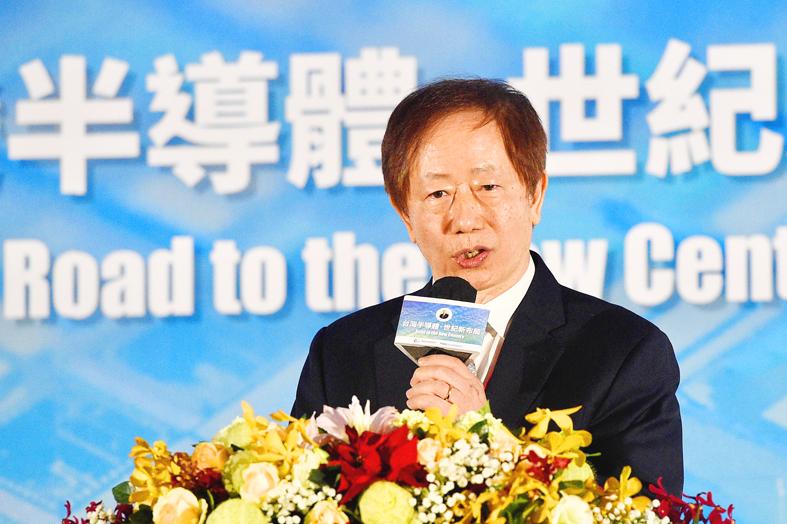If China invades Taiwan there would be no winners and everyone would lose, and people should draw lessons from the Russia-Ukraine war, which is not good for either side, Taiwan Semiconductor Manufacturing Co (TSMC, 台積電) chairman Mark Liu (劉德音) told CNN.
The interview on the Fareed Zakaria GPS program on Sunday came at a time of heightened cross-strait tensions amid a potential visit to Taiwan by US House of Representatives Speaker Nancy Pelosi.
“People in Taiwan have earned their democratic system and they want to choose their way of life,” Liu said in the interview. “Indeed, chip supply is a critical business in Taiwan, but had there been a war in Taiwan, probably the chip is not the most important thing we should worry about, because this invasion is destruction of the world rules-based order. The geopolitical landscape would totally change.”

Photo: George Tsorng, Taipei Times
Liu said the Russia-Ukraine war is not good for either side and it is a lose-lose-lose scenario for the Western world, Russia and Ukraine.
People should draw lessons from the war in Ukraine, and look at Taiwan and decide how to avoid a war, and how to ensure the engine of the world economy continues humming, he said.
Asked by Zakaria what Taiwan would look like in the future, Liu said that he hopes Taiwan does not get discriminated against because it is close to China.
“No matter your relation with China, Taiwan is Taiwan,” Liu said. “We want to unleash the innovation for the world into the future continuously and not to be scared because we have some disputes with our neighbors.”
Zakaria asked Liu whether Taiwan being so integral to the Chinese supply chain creates a danger for Taiwan or serves as a deterrent since Beijing says that it needs to have total control of this valuable asset.
Liu said that China accounts for about 10 percent of TSMC’s business and that it only supplies the consumer market rather than the military or other markets.
“If they [China] need us, it is not a bad thing,” he said.
However, he warned that a military invasion by China would make TSMC factories inoperable and that it would also hurt China.
“Because our interruption would create great economic turmoil in China — suddenly their most advanced component supply disappears. It is an interruption, I must say, so people will think twice on this,” Liu said. “Nobody can control TSMC by force ... because it is a sophisticated manufacturing facility that depends on the real-time connection with the outside world,” such as Europe, the US and Japan for materials, chemicals and engineering software.
Minister of Economic Affairs Wang Mei-hua (王美花) yesterday told reporters that Liu’s comments were correct because if China were to invade, Taiwan’s semiconductors would not be available to the world and that would cause serious economic problems.
“That is why we say if something happens to Taiwan, the world would suffer the consequences,” Wang said.

The Central Election Commission has amended election and recall regulations to require elected office candidates to provide proof that they have no Chinese citizenship, a Cabinet report said. The commission on Oct. 29 last year revised the Measures for the Permission of Family-based Residence, Long-term Residence and Settlement of People from the Mainland Area in the Taiwan Area (大陸地區人民在台灣地區依親居留長期居留或定居許可辦法), the Executive Yuan said in a report it submitted to the legislature for review. The revision requires Chinese citizens applying for permanent residency to submit notarial documents showing that they have lost their Chinese household record and have renounced — or have never

A magnitude 5.6 earthquake struck off the coast of Yilan County at 12:37pm today, with clear shaking felt across much of northern Taiwan. There were no immediate reports of damage. The epicenter of the quake was 16.9km east-southeast of Yilan County Hall offshore at a depth of 66.8km, Central Weather Administration (CWA) data showed. The maximum intensity registered at a 4 in Yilan County’s Nanao Township (南澳) on Taiwan’s seven-tier scale. Other parts of Yilan, as well as certain areas of Hualien County, Taipei, New Taipei City, Taoyuan, Hsinchu County, Taichung and Miaoli County, recorded intensities of 3. Residents of Yilan County and Taipei received

Taiwan has secured another breakthrough in fruit exports, with jujubes, dragon fruit and lychees approved for shipment to the EU, the Ministry of Agriculture said yesterday. The Animal and Plant Health Inspection Agency on Thursday received formal notification of the approval from the EU, the ministry said, adding that the decision was expected to expand Taiwanese fruit producers’ access to high-end European markets. Taiwan exported 126 tonnes of lychees last year, valued at US$1.48 million, with Japan accounting for 102 tonnes. Other export destinations included New Zealand, Hong Kong, the US and Australia, ministry data showed. Jujube exports totaled 103 tonnes, valued at

BIG SPENDERS: Foreign investors bought the most Taiwan equities since 2005, signaling confidence that an AI boom would continue to benefit chipmakers Taiwan Semiconductor Manufacturing Co’s (TSMC, 台積電) market capitalization swelled to US$2 trillion for the first time following a 4.25 percent rally in its American depositary receipts (ADR) overnight, putting the world’s biggest contract chipmaker sixth on the list of the world’s biggest companies by market capitalization, just behind Amazon.com Inc. The site CompaniesMarketcap.com ranked TSMC ahead of Saudi Aramco and Meta Platforms Inc. The Taiwanese company’s ADRs on Tuesday surged to US$385.75 on the New York Stock Exchange, as strong demand for artificial intelligence (AI) applications led to chip supply constraints and boost revenue growth to record-breaking levels. Each TSMC ADR represents